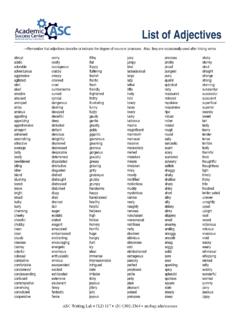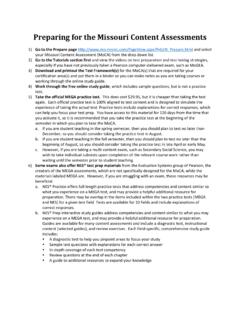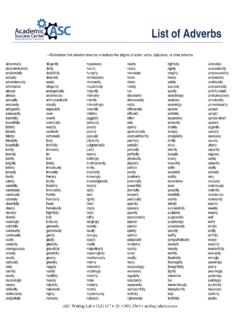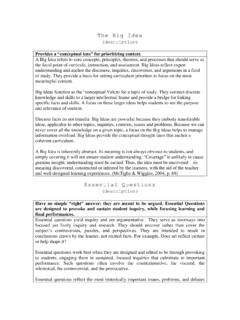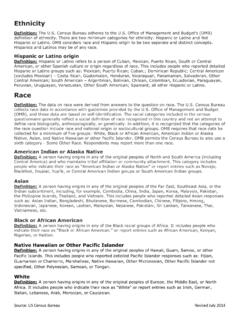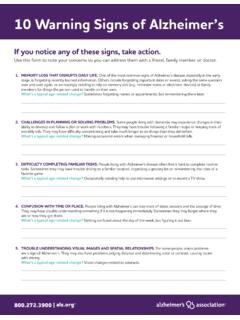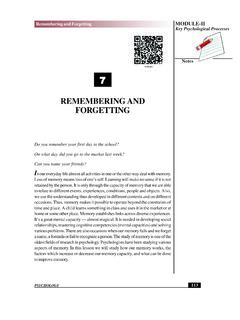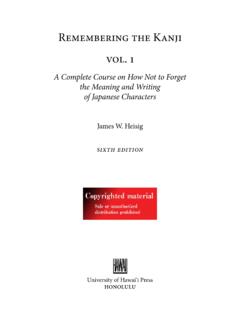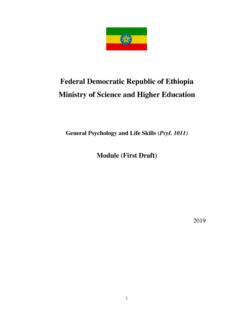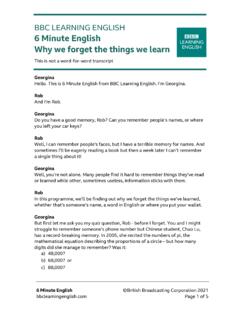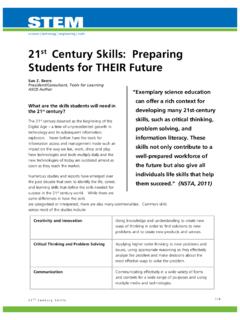Transcription of Memory Strategies - Missouri Baptist University
1 Adapted From: Van Blerkom, (2009). College Study Skills: Becoming a strategic FLD 117 Sensory MemoryYour senses are always busy numerous stimuli are constantly bombarding the sensory receptors in your eyes, nose, ears, tongue, and skin. However, you are not aware of all of this activity because the unimportant stimuli are quickly forgotten. What is the advantage of quickly forgetting this multitude of information? Research has shown that humans can only pay attention to one cognitively demanding task at a time. Imagine if your brain gave full attention to every smell or sound detected by a receptor. You would never be able to concentrate!When you decide that you want to remember information, it must be moved into the Short-Term Memory for processing. However, in order to make this transfer, you must encodethe information, you must make it and Retrieval of InformationHave you ever spent hours studying only to have difficulty remembering information during the exam?
2 This is a common occurrence among students, and it is caused by study habits that fail to transfer informatiointo long-term Memory . The Information Processing Model shows that remembering is hard work, with work being the key word. In order to be able to Steps to Forming MemoriesThe STM is divided into the Immediate Memory (IM) and the Working Memory (WM). Once encoded, information is transferred into your IM where the information that you are currently thinking about is stored. You can remember only a limited amount of information in the IM, and you can remember it for only about 20 to 30 seconds without continual rehearsal. For instance, if you need to remember a phone number as you walk across pencil, you usually will repeat the number overlikely would not remember the number once you reached the other side of the order to transfer information into your longThis part of your STM is appropriately named because you must actively LTM.
3 The harder you work on the material by means of active study Strategies , the more likely it will make it to youLTM. If you have ever studied for a test by just reading over the material a few times, you have realized that this is not avery effective study strategy. Just reading the material is not enough to get it into your LTM because when you read, much of that information never makes it past the IM into the Study Skills: Becoming a strategic : 117 (314)392-2364 stimuli are constantly bombarding the sensory receptors in your eyes, nose, ears, tongue, and skin. However, you are not aware of all of this activity because the stimuli are quickly forgotten. What is the advantage of quickly forgetting this multitude of information? Research has shown that humans can only pay attention to one cognitively demanding task at a time. Imagine if your brain gave ry smell or sound detected by a receptor.
4 You would never When you decide that you want to remember information, it must be moved Term Memory for processing. However, in order to make this the information, Long-Term Memory (LTM)After being processed in the Working Memory , information is transferred to the Long-Term Memory . The degree to which you work on the information in your WM also affects how it is stored in your LTM. Information that you work on and study a lot will be well filed in your LTM. It will be easy for you to locate this file during an exam, for example. Information that is only worked a little will not be filed well in the LTM, and you will have difficulty retrieving the underscores the importance of developing and using active Memory Strategies when studying. These Strategies help you organize the material in your working Memory so that it can be effectively stored in the MemoryShort-Term MemoryLong-Term MemoryMemory and Retrieval of InformationHave you ever spent hours studying only to have difficulty remembering information during the exam?
5 This is a common occurrence among students, and it is to transfer information emory. The Information Processing Model shows that remembering is hard work, with work being the key word. In order to be able to remember what you are studying you must use Strategies that help you actively work material, organizing, repeating information, and quizzing yourself. This is the most efficient way to transfer information into your organized way so that it can be retrieved during an to Forming MemoriesShort-Term Memory (STM)The STM is divided into the Immediate Memory (IM) and the Working Memory (WM). Once encoded, information is transferred into your IM where the information that you are currently thinking about is stored. You can remember only a ion in the IM, and you can remember it for only about 20 to 30 seconds without continual rehearsal. For instance, if you need to remember a phone number as you walk across aroom to find a piece of paper and pencil, you usually will repeat the number overand over, continually rehearse it.
6 If you did not do this, you most likely would not remember the number once you reached the other side of the into your long-term Memory (LTM), you must first move it from theThis part of your STM is appropriately named because you must actively work onthe material in order to transfer it into LTM. The harder you work on the material by means of active study Strategies , the more likely it will make it to youLTM. If you have ever studied for a test by just reading over the material a few times, you have realized that this is not avery effective study strategy. Just reading the material is not enough to get it into your LTM because when you read, hat information never makes it past the IM into the StrategiesTerm Memory (LTM)After being processed in the Working Memory , information is transferred to the Term Memory . The degree to which you work on the information in your WM also affects how t is stored in your LTM.
7 Information that you work on and study a lot will be well filed in your LTM. It will be easy for you to locate this file during an exam, for example. Information that is only worked a little will not be filed well in TM, and you will have difficulty retrieving the underscores the importance of developing and using active Memory Strategies when studying. These Strategies help you organize the material in your working Memory so that it can be ely stored in the what you are studying you must use Strategies that help you actively work on the material, organizing, repeating information, and quizzing yourself. This is the most efficient way to transfer information into your long-term Memory in an organized way so that it can be retrieved during an The STM is divided into the Immediate Memory (IM) and the Working Memory (WM).
8 Once encoded, information is transferred into your IM where the information that you are currently thinking about is stored. You can remember only a ion in the IM, and you can remember it for only about 20 to 30 seconds without continual room to find a piece of paper and and over, continually rehearse it. If you did not do this, you most , you must first move it from theIM into the WM. the material in order to transfer it into LTM. The harder you work on the material by means of active study Strategies , the more likely it will make it to your LTM. If you have ever studied for a test by just reading over the material a few times, you have realized that this is not avery effective study strategy. Just reading the material is not enough to get it into your LTM because when you read, Memory StrategiesAdapted From: Van Blerkom, (2009). College Study Skills: Becoming a strategic FLD 117 General Memory StrategiesWhat steps should you take if you are having trouble moving information from your working Memory to your longterm Memory ?
9 As thename implies, you must work on the information in your working Memory in order to transfer it into the long-term Memory . Featured below are some simple Strategies that, if practiced, will help you retain information and, ultimately,do well on Practice Spaced practice is the opposite of cramming. It involves spacing your study time over a long period of time. Instead of studying the night before an exam for eight hours, study for two hours a day beginning four days before the exam. This allows the information to consolidate in your long Spaced practice also leads to the information being better organized in your long-term Overlearning involves exactly what the name implies continuing to work on the material even after you have learned it. This practice improves your Memory of the information. As you review the learned material in other ways, you form new associations that can help you when recalling the information.
10 If you suffer from test anxiety, overlearning is something that you should do for every test. Anxiety interferes with your ability to recall information. However, overlearned information is so firmly embedded in your long-term Memory that it not as susceptible to Study Skills: Becoming a strategic : 117 (314)392-2364 Memory StrategiesWhat steps should you take if you are having trouble moving information from your working Memory to your longname implies, you must work on the information in your working Memory in order to term Memory . Featured below are some simple Strategies that, if practiced, will help you do well on PracticeSpaced practice is the opposite of cramming. It involves spacing your study time over a long period of time. Instead of studying the night before an exam for eight hours, study for two hours a day beginning four days before the exam.
